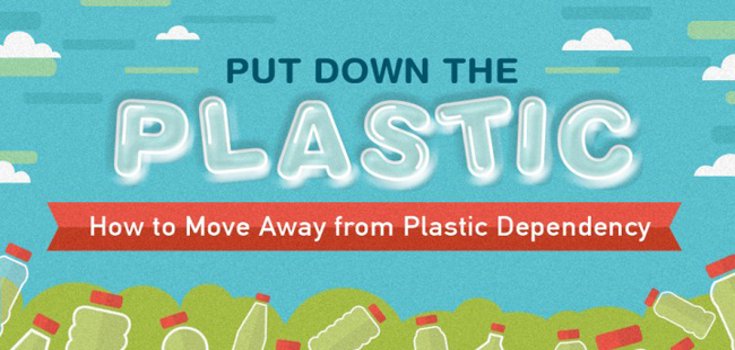This is Why We Need to Stop Using Plastic (Infographic)

How often do you use plastic? It may be a convenient way to drink water throughout the day, but our dependency no plastic water bottles is having detrimental impacts on the environment. In fact, about 32 million tons of plastic waste was generated in 2012. Not only does this pollute our oceans, but it negatively impacts the entire ecosystem as the plastic particles are consumed by animals. The telling infographic below may sway you to use less plastic in 2015.
It was recently revealed that more than 5 trillion pieces of plastic are floating around in the oceans. Much of this pollution is actually in the form of small, ‘confetti-sized’ particles. These small pollution particles are being consumed by fish and eventually travel up the food chain – causing potentially serious consequences for the health of wildlife and humans alike.
One study published in Nature, Scientific Reports, found:
“We did find that the chemicals do transfer from the plastic to the fish,” said lead author Chelea Rochman, “and we saw a greater concentration in the fish that ate the plastic that had been in the ocean than the fish that had eaten the controlled diet or the clean plastic diet.”
What’s more, both plastic-eating groups had tumor development. Those fed clean plastic had cell alteration while those who ate dirty plastic experienced cell death. One fish on the dirty plastic diet was found to have 25% of its liver taken over by a tumor when it was dissected.
Related: Bottled Water isn’t All that Great Anyway – Here’s Why
Even more concerning, about one million sea birds and 100,000 marine mammals are killed annually from plastic in our oceans.

Thanks to the below infographic by CustomMade, you can easily digest ways to cut back on plastic use. Instead of using plastic, try alternative materials such as reclaimed wood, steel, and glass. These can help gradually reduce our reliance on plastic and pose less of an impact on the Earth. Reducing plastic use can range from short term decisions—swapping plastic sandwich bags for washable canvas or throwaway plastic utensils for metal ones—to more long term changes, such as trading in your plastic picnic tables for reclaimed wood barn tables. Making smart swaps can make a big difference over time.
See below for other tips on how to move away from our plastic dependency.


What really irks me is that non-toxic bio-degradable plastic is available for everyone to use…yet the powers that be refuse to implement this sane option…same with the lining in cans…this smacks of depraved indifference & psychopathic behavior that leaves our children’s children & a myriad of lifeforms to the preventable yet extremely deleterious effects of corptocratic greed….it really sucks & these board room directors need to be arrested for crimes against humanity & all the rest of the sentient beings on this beautiful planet….they have no shame these sociopaths.
Aluminum? Aluminum has found to being absorbed by the sodas. So we’re drinking the aluminum, which is a heavy metal. Not good. Steel isn’t much better. So get rid of those two choices. I remember a time in my young childhood (late 70s/early 80s) when milk was delivered in glass bottles to my house. That was also back when (researched for proofs sake) that every major city and a lot of urban ones had a glass cleaning facility for the bottles. The bottles would be taken there, cleaned and sandblasted, then sent back out. Recycling. But the Greatest Generation deemed it was too expensive, so they stopped it for plastic. Baby Boomers didn’t do anything about it, except for the Chicago Milk/ice cream guy, who’s milk does come in glass bottles (name escapes me). It’s time for gen X & Y to bring it back. Go back to the ways that worked, helped the planet, maintained the balance, and put people back to work.
I have made many changes to reduce use of plastic. There is no plastic in my kitchen and I drink spring water from glass bottles I fill at the source. I use cloth produce bags and cloth grocery bags. I don’t eat processed foods for the most part. I cook from scratch and use fresh organic produce. The problem I wrestle with is plastic packaging. It is not recyclable and almost impossible to buy some produce and other household goods without plastic packaging. Do you know of anyone who recycles it? I have tried to clean it and put it with recyclable grocery bags at the local store, but I am fairly sure they just throw it away. It is the only trash I produce and it is upsetting.